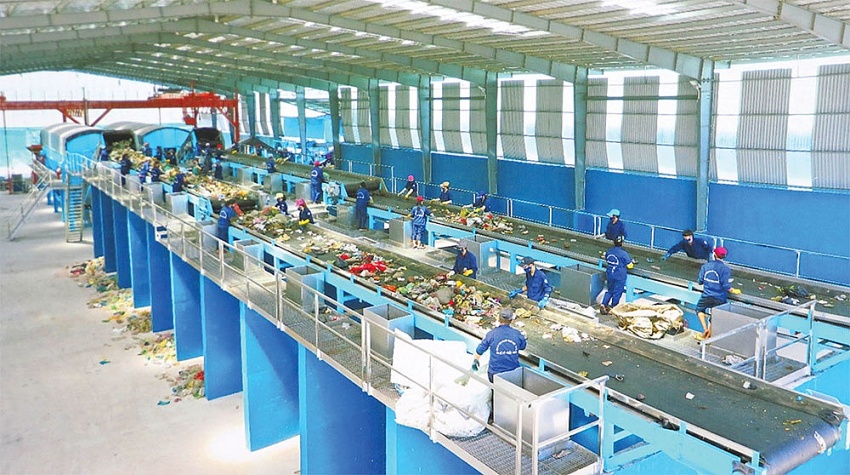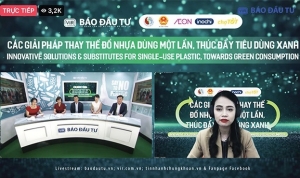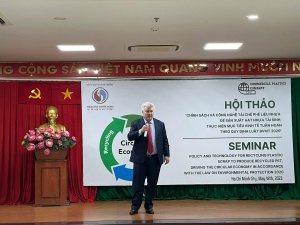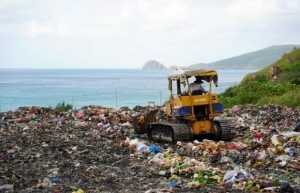Product prices at risk of hike with incoming recycle rules
 |
| Draft rules are specifying the costs for overseeing various aspects of waste collection and treatment, photo Le Toan |
Huynh Thi My, secretary general of the Vietnam Plastic Association, said plastic enterprises are very supportive of responsible production for environmental protection, but there are also many concerns related to fees and extended producer responsibility (EPR) for the plastic industry.
“According to the draft regulations, nearly all types of packaging must pay a recycling fee. Paying a high recycling fee will cause businesses to have to factor in the production cost and output product price, and consumers will have to pay this fee, adding to the burden on them,” said My.
She explained that plastic groups have faced a slump of orders of 15-20 per cent on-year so far in 2023.
EPR in Vietnam is implemented via Decree No.08/2022/ND-CP implementing some articles in the Law on Environmental Protection, and an additional circular that were both made effective in January 2022.
Under the draft decision regarding recycling costs determination proposed by the Ministry of Natural Resources and Environment, unit volume of product and packaging (Fs) includes costs for sorting, collecting, transporting, and recycling products and packaging, as well as administrative expenses to support the implementation of recycling responsibilities of manufacturers and importers.
The recycling costs apply adjustment factor is the coefficient that demonstrates recycling efficiency. Products and packaging with high recycling efficiency have a low adjustment factor and vice versa. The draft also specifies administrative costs for administering, overseeing, and assisting producers and importers in carrying out their waste collection and treatment responsibilities. As Decree 08 indicated, 3 per cent of the financial contribution to assist waste treatment would be removed.
Chu Thi Van Anh, general secretary of the Vietnam Beverage Association, said that many proposals for Fs recycling norms are unreasonably high, which leads to the risk of high consumer prices and production costs.
She cited that the Fs for aluminium packaging is nearly five times higher than the average in other countries, and Fs with mixed paper is 4.8 times higher than the global average.
“This price increase only takes into account the direct cost of recycling packaging. If we include the cost of recycling indirect packaging such as cartons, as well as the cost of recycling equipment and transport, the price increase is much higher,” Anh said.
Baker McKenzie cited the main requirements of Decree 08 that all producers and importers subject to recycling obligations will be required to register and report on their recycling activities or declare their contribution to the Vietnam Environmental Protection Fund every year before March 31. If producers or importers authorise a third party to recycle on their behalf, the third party is responsible for registering and reporting on recycling activities.
Each type of packaging and product that needs to be recycled will be subject to a mandatory recycling rate on the basis of the life cycle, disposal rate, and collection rate of the product or packaging, national recycling targets, environmental protection requirements, and socioeconomic conditions. This required recycling rate will be measured and adjusted every three years.
 | Plastic use drop hinges on consumers High investments in more environmentally-friendly recycling and alternative solutions for plastics and the existing habit of using single-use plastics are challenges that hinder businesses from developing circular economy solutions and promoting sustainable growth. |
 | Seminar held on recycling plastic waste Responding to World Environment Day 2023, the Centre of Natural Resources and Environment Communications, under the Ministry of Natural Resources and Environment, held a seminar on May 18 on policy and technology for recycling plastic scrap to produce recycled PET, while driving the circular economy. |
 | EPR fees to add to plastic companies' bills Although the Environmental Producer Responsibility (EPR) scheme could create an incentive for the phase-out of eco-unfriendly and non-recyclable packaging in the long term, it would shift the heavy financial burden for end-of-life waste management from municipalities to producers and importers. |
What the stars mean:
★ Poor ★ ★ Promising ★★★ Good ★★★★ Very good ★★★★★ Exceptional
Latest News
More News
- Vingroup consults on carbon credits for electric vehicle charging network (January 28, 2026 | 11:04)
- Bac Ai Pumped Storage Hydropower Plant to enter peak construction phase (January 27, 2026 | 08:00)
- ASEAN could scale up sustainable aviation fuel by 2050 (January 24, 2026 | 10:19)
- 64,000 hectares of sea allocated for offshore wind surveys (January 22, 2026 | 20:23)
- EVN secures financing for Quang Trach II LNG power plant (January 17, 2026 | 15:55)
- PC1 teams up with DENZAI on regional wind projects (January 16, 2026 | 21:18)
- Innovation and ESG practices drive green transition in the digital era (January 16, 2026 | 16:51)
- Bac Ai hydropower works stay on track despite holiday period (January 16, 2026 | 16:19)
- Fugro extends MoU with PTSC G&S to support offshore wind growth (January 14, 2026 | 15:59)
- Pacifico Energy starts commercial operations at Sunpro Wind Farm in Mekong Delta (January 12, 2026 | 14:01)

 Tag:
Tag:















 Mobile Version
Mobile Version